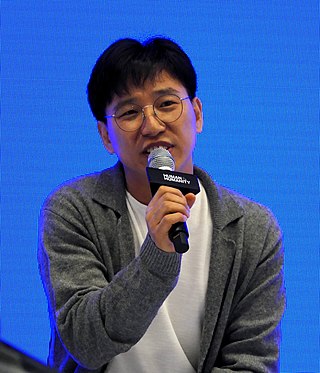
Pak Tu-jin was a Korean poet. A voluminous writer of nature poetry, Pak Tu-jin is chiefly notable for the way he turned his subjects into symbols of the newly emerging national situation of Korea in the second half of the 20th century.

Seo Jeong-ju was a Korean poet and academic who wrote under the art name Midang. He is widely considered one of the best poets in twentieth-century Korean literature and was nominated five times for the Nobel Prize in literature.

Jeong Ji-yong, often romanized in literature as Cheong Chi-yong, was a Korean poet and translator of English poetry who "opened a new horizon of poetic possibilities through chiselled expression, tempered sentiments, and precise visual imagery" according to the scholar of Korean poetry, Brother Anthony.

Moh Youn Sook is a Korean female poet.
Pi Cheon-deuk, also known by their pen name Geum-a, was a Korean poet and an English literature scholar, but primarily an essayist.
Kwak Jae-gu is a South Korean modern poet.
Kim Myeongin is a South Korean poet and author.
Mun Tae-jun is a South Korean poet.
Mah Chonggi is a Korean poet.
Jang Jeongil is a South Korean poet, playwright, and novelist.
Yi Seongbok is a South Korean poet.

Shin Yong-Mok is a South Korean poet.
Kim Haki is a modern South Korean writer and ex political-prisoner.
Lee Garim is a South Korean writer.
Lee Mun Ku was a South Korean novelist.
Lee SungBoo was a South Korean poet and novelist.

Moon Deoksu was a South Korean poet.
Seong Changyeong was a modern South Korean poet.
Lee Jangwook is a South Korean poet, novelist, and critic.

Jang Seoknam is a South Korean poet.







